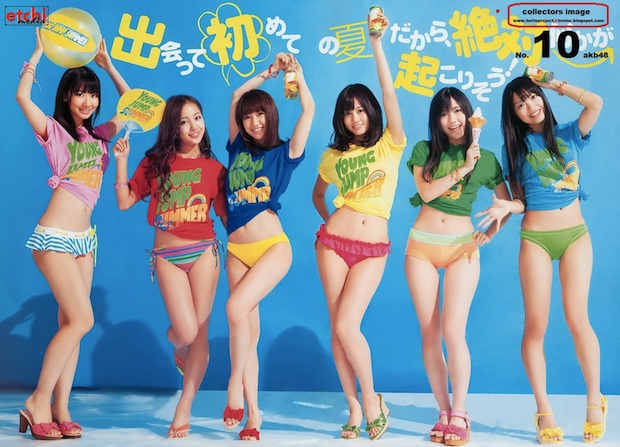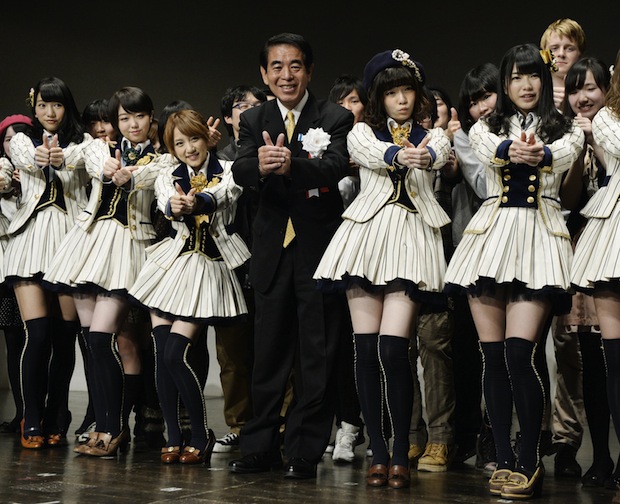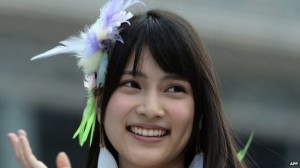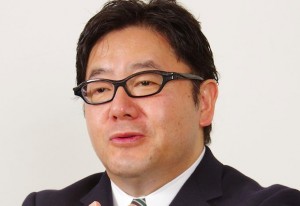The results have been announced of a survey by Video Research of five commercial TV broadcasters in Kanto (the area including Tokyo and Yokohama), Kansai (Osaka, Kyoto, Kobe etc) and Nagoya. The survey looked at the celebrities appearing in TV commercials in the first half of 2014.
In all three regions the top ranker was actress Aya Ueto. However, the surprise came in the results for AKB48, seven of whose members or ex-members appeared individually in the top twenty for the same period last year — but this year they only managed one entry.
Last year Atsuko Maeda, Mariko Shinoda, Yuko Oshima, Haruna Kojima, Haruka Shimazaki, Mayu Watanabe, and Yuki Kashiwagi all had slots in the top twenty (some of these idols were already ex-members by this point but their claim to fame rests solely in the group). This year, while AKB48 as a group still has its fair share of campaigns, the only individual idol in the top twenty was Mayu Watanabe, currently seen as the most popular idol in the group. Watanabe also only ranked in the Kanto region; she wasn’t popular in Kansai or Nagoya.

Japanese TV commercials are dominated by celebrities, models and actors. It is not seen as shameful or damaging to the career to appear in commercials, even when they seem only to appear in TV commercials rather than do genuine acting jobs. (Aya Ueto is a case in point.)
Of course, these results are not for nationwide campaigns, so we should write off the AKB48 juggernaut just yet (after all, AKB holds the Guinness World Record for the most number of appearances in different television commercials in a single day… 90!), though it is a worrying decline for its accountants. The pop idol group’s mainstream success is largely dependent on its appearance in lucrative advertising campaigns (sometimes for completely incongruous products or services), since the concerts, events and music sales are generally seen as confined still to its (not insignificant) otaku fan base.
But with the “graduation” of some of the most recognizable faces from AKB in the last two or three years — going on to mixed careers in acting and music — the group itself has lost some of its visual appeal. The proliferation of “sister groups” around the country and the rise of some of the idols in those groups has also possibly diluted the prominence of the original team’s hard-core members. As Finance Minister Taro Aso recently remarked, AKB48 is a case of the sum being stronger than the individual parts (i.e. the members).

It might also be that sponsors have finally wised up to how having scantily-clad young girls associated with their services doesn’t do their reputations much good (especially abroad) or that, ultimately, the ads weren’t paying off in higher sales.
Aside from their sexually provocative songs and presentation, the AKB48 way of doing business has been criticized for being damaging to the Japanese domestic music industry, plus the merchandising exploitative to consumers. There have also been accusations of sexual hypocrisy (members aren’t allowed boyfriends and get punished for infringements) and links between its management and the mafia.
Intriguingly, a media report about the survey was a major listing on Yahoo! News in Japan yesterday but has since been deleted. Yahoo! News article regularly disappear in such a fashion but rarely quite so fast. Could it be that AKB’s powerful friends (who include the Prime Minister!) put pressure on the news portal to remove the unfavorable article? Or are we getting paranoid?
























2 Comments
I know very well I’m commenting on a basically dead blog but confusing seasonal commercial appearances with overall TV appearances is a clumsy mistake that could only be done by a novice, or someone acting in bad faith. I’m hoping the author of this site is just the former.
http://www.akb48.co.jp/about/schedule/
Here you can see the daily TV schedule by clicking on each day on the calendar and sincerely I’m not seeing any downward variations whatsoever.
Also thanks for the laugh at “damaging to the Japanese domestic music industry”, as usual the reference article was written by the usual suspects but for a good measure I’m repeating what I’m saying to everyone: can you give me a list of all the wonderful bands that AKB has actively put out of business over these years? You can write an extensive list of it next time you make another article ’bout AKB, it would at least justify the hysterical tone.
@frgrscg
“Hysterical tone”? Sorry, we don’t feel there is anything hysterical about the tone of the article. It was merely pointing out a possible shift in regional TV ads and their use of AKB48, and as background touched on how TV advertising in Japan customarily uses celebrities and then some of the issues raised about AKB48. We weren’t talking about AKB48’s general popularity, hence why nothing is mentioned about declining album sales etc.
Maybe their TV schedules are as busy as ever. Maybe not. That’s another article.
This one was just about the possible implications of the one survey. Ultimately it is too early to tell. Please note that question mark in the title, which is designed to get people thinking, rather than provide a conclusive answer, which is surely impossible in this case.
Again, this wasn’t the subject of the article at all but it seems that the criticism about AKB48’s effect on the music industry is not necessarily that they have replaced other “wonderful bands” but that the industry has become far less diverse now. This is also surely the influence of other general trends and strategies by the powers that be. Again, that would be a different article, not this one.
Sorry for being novices!